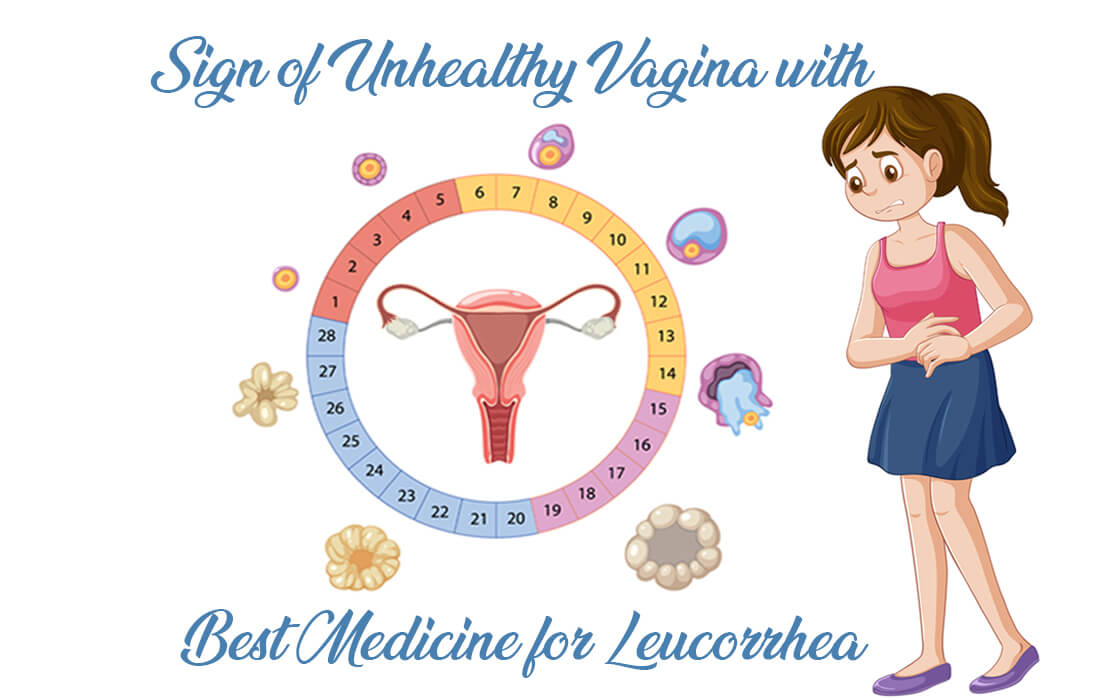
A woman’s reproductive health is of utmost importance and concern. One common issue that women may encounter is leucorrhoea, a condition characterized by abnormal vaginal discharge. While vaginal discharge is normal and serves various essential functions in maintaining vaginal health, an excessive or unusual discharge can indicate an unhealthy vagina. This blog post delves into identifying the indications of an unhealthy vaginal condition, incorporates best medicine for leucorrhea, and provides effective management tips.
What is Leucorrhoea?
Leucorrhoea is a common gynaecological condition characterized by an abnormal vaginal discharge. This discharge is typically white or yellowish and is separate from normal menstrual bleeding. It is a prevalent issue for women of all ages and can stem from various causes. Mild leucorrhoea is a normal aspect of the female reproductive system, but an excessive or unusual discharge may indicate underlying health concerns like infections or hormonal irregularities. Monitoring changes in the colour, odour, consistency, and also frequency of vaginal discharge is essential to identify potential problems.
Signs of an Unhealthy Vagina with Leucorrhoea
1. Change in Color and Odor:
Normal vaginal discharge is typically clear, milky white, and odourless. If you notice a difference in the colour or develop a foul-smelling discharge, it may be a sign of an infection. A green or yellowish tint and a strong, unpleasant odour are red flags that require leucorrhoea medicine in ayurveda.
2. Itching and Irritation:
If you experience excessive discharge, itching, and irritation in the vaginal area, it may be a sign of an unhealthy vagina. These discomforting symptoms often point to the presence of an underlying infection or an imbalance in the natural vaginal flora. Such imbalances can disrupt the delicate pH balance of the vagina, allowing harmful microorganisms to flourish and leading to uncomfortable sensations like itching and irritation.
3. Pain or Discomfort During Urination:
Leucorrhoea combined with painful or uncomfortable urination can signal an underlying concern, possibly a urinary tract infection (UTI) or other issues. UTIs often bring about a burning sensation during urination, increased frequency of urination, and discomfort in the lower abdomen.
4. Pelvic Pain:
It’s important not to overlook persistent pelvic pain, especially when accompanied by unusual vaginal discharge, as it could indicate pelvic inflammatory disease (PID) or other gynaecological conditions that require the best medicine for leucorrhea.
5. Abnormal Bleeding:
Vaginal bleeding, especially when accompanied by leucorrhoea, should be approached with caution as it may signal an underlying concern. This combination of symptoms may indicate underlying cervical or uterine issues.
6. Discomfort During Intercourse:
Pain or discomfort during sexual intercourse, often referred to as dyspareunia, can be associated with an unhealthy vagina. Leucorrhoea can contribute to this discomfort and may indicate an infection or inflammation.
7. Recurrent Infections:
Frequent occurrences of leucorrhoea, especially if it is associated with infections like yeast infections or bacterial vaginosis, may suggest an underlying problem with your vaginal health.
Managing Leucorrhoea and Promoting Vaginal Health
Managing leucorrhoea and promoting vaginal health involves a combination of lifestyle adjustments, hygiene practices, and best ayurvedic medicine for leucorrhea, depending on the underlying causes of the condition. Here are some effective steps to manage leucorrhoea and maintain optimal vaginal health:
Good Hygiene:
- Gentle Cleansing: Clean the external genital area with mild, unscented soap and lukewarm water. Avoid using harsh soaps, douches, or strong chemical cleansers, as they can disrupt the natural pH balance and beneficial bacteria in the vagina.
Proper Clothing and Underwear:
- Breathable Fabrics: Choose underwear made of breathable materials, such as cotton. Cotton allows for better air circulation and moisture absorption, reducing the risk of excessive moisture in the vaginal area.
- Loose-Fitting Clothing: Wear loose-fitting, breathable clothing to allow air to circulate and prevent excessive sweating and also moisture build-up.
Safe Sexual Practices:
- Use Protection: Always use barrier methods like condoms to protect against sexually transmitted infections (STIs) that can contribute to leucorrhoea and other vaginal health issues.
- Hygiene After Intercourse: After sexual activity, it’s a good practice to urinate and clean the genital area gently to reduce the risk of infection.
Maintain a Balanced Diet:
- Stay Hydrated: Properly hydrating by drinking sufficient water is vital, as it contributes to overall health, including the well-being of the vaginal region.
- Nutrient-Rich Diet: Consume a balanced diet rich in fruits, vegetables, whole grains, and also lean proteins. Nutrients like vitamins and minerals can bolster your immune system and maintain vaginal health.
Avoid Irritants:
- Feminine Hygiene Products: Avoid using scented tampons, pads, or feminine hygiene products, as fragrances and chemicals in these products can irritate the vaginal area.
- Perfumed Soaps and Douches: Avoid scented soaps and douches, as they disrupt the vaginal pH balance and beneficial flora.
Menstrual Hygiene:
- Maintain good menstrual hygiene practices by changing tampons or pads at regular intervals during your period to prevent bacterial growth and infections.
- Failure to maintain menstrual hygiene can cause discomfort, odors, and may also result in serious conditions like vaginal infections or TSS.
- Additionally, washing your hands thoroughly before and after handling menstrual products is advisable. It can minimize the risk of introducing harmful bacteria into the vaginal area.
Stress Management:
- Stress can affect both immune system and hormonal balance, potentially impacting vaginal health. To boost your overall well-being, involve yourself in stress-relief approaches such as yoga, meditation, or a consistent exercise routine.
Remember that vaginal health can vary from person to person, and it’s essential to pay attention to your body’s signals and consume best medicine for leucorrhea if you have concerns. To manage leucorrhoea and support vaginal health, focus on good hygiene, a healthy lifestyle, and also seeking advice when needed.
Conclusion
Effective management of leucorrhoea can mitigate concerns about an unhealthy vagina, emphasizing the importance of both proper care and attention. Awareness of the signs, effective leucorrhoea management, and prioritizing reproductive health are crucial takeaways from this article. If you experience any unusual symptoms, determine the underlying cause and receive the appropriate best ayurvedic medicine for leucorrhea. Remember that early detection and intervention can help maintain a healthy vagina and overall well-being.










